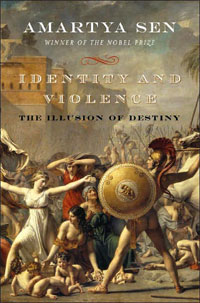Book Notes
 Amartya Sen, Identity and Violence; The Illusion of Destiny (New York: W.W. Norton, 2006), 215pp.
Amartya Sen, Identity and Violence; The Illusion of Destiny (New York: W.W. Norton, 2006), 215pp.
Amartya Sen, Harvard professor and winner of the 1998 Nobel Prize in Economics, still remembers the day sixty-three years ago when a Muslim day laborer named Kader Mia stumbled through the gate into his family's yard in Dhaka, bleeding from knife wounds and begging for help. His father rushed him to the hospital where he eventually died. Kader was a Muslim who was murdered by a Hindu thug, and was but one of the thousands of people who died in Muslim-Hindu riots that erupted in British India in the 1940's. Although most of the rioters shared an economic class identity as poor people, partisans demonized each other with a lethal, singularist "identity of violence," in this instance a diminution of their humanity to religious ethnicity: "The illusion of a uniquely confrontational reality had thoroughly reduced human beings and eclipsed the protagonists' freedom to think." Sen's book is an exploration of this memory of his as a bewildered eleven-year-old boy.
Far too much violence in the world today is fomented by the illusion that people are destined to a "sectarian singularity." Stereotyping people with a singular identity leads to fatalism, resignation, and a sense of inevitability about violence. It partitions people and civilizations into binary oppositions, it ignores the plural ways that people understand themselves, and obscures what Sen calls our "diverse diversities." In particular, he objects to the "clash of civilizations" thesis made popular by Samuel Huntington. Along the way he explores the implications of his thesis for multiculturalism, public policy, globalization, terrorism, anti-Western rage, democracy, and theories of culture.
Sen argues against identity violence caused by the illusion of destiny in three ways. First, he appeals to our common humanity; everyone laughs at weddings, cries at funerals, and worries about their children. More important than any of our external differences, even though these are powerful and important, is our shared humanity. Second, he makes the obvious point that all people enjoy plural identities. To understand a person one must consider factors of civilization, religion, nationality, class, community, culture, gender, profession, language, politics, morals, family of origin, skin color, and a multitude of other markers. Plus, these diverse differences within a single individual depend on one's social context, whether the trait is durable over time, relevant, a factor of constraint or free choice, and so on. Finally, Sen urges us to transcend the illusion of destiny and identity violence by what he calls "reasoned choice." Instead of living as if some irrational fate destines people to confrontation with others who are different, a person needs to make a rational choice about what relative importance to attach to any single trait. Although Sen never explains why rational people succumb to the irrational violence of identity instead of choosing enlightened self-interest, economic incentives, and geo-political peace, this readable book by one of our most brilliant thinkers conveys an important reminder: "We can do better."


